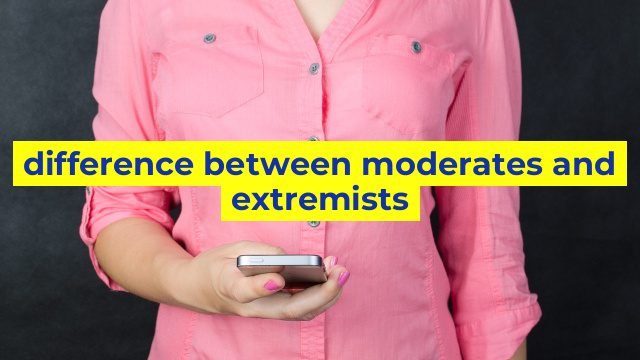The Fundamental Differences Between Moderates and Extremists
When it comes to political, social, or religious matters, some people have a moderate stance, while others have an extreme one. Both moderates and extremists have their own perspectives and beliefs, but what makes them different from one another? Here are the key differences between these two groups.
1. Tolerance and Acceptance
Moderates generally tend to be more tolerant and accepting of different ideas, opinions, and values. They believe that diversity is a strength and that people should be free to express themselves in their own ways, as long as they do not harm others or violate the law. They respect different religions, cultures, and lifestyles and believe in peaceful coexistence.
On the other hand, extremists often have a narrow and rigid mindset that leaves little room for diversity and dissent. They believe that their own values and beliefs are superior to others, and that those who do not share their views are enemies or infidels. They tend to be intolerant, xenophobic, and discriminatory towards people who are different from them, and often use violence or aggression to enforce their views.
2. Compromise and Negotiation
Moderates are open to compromise and negotiation as a way of resolving conflicts and finding common ground with others. They believe in the power of dialogue, cooperation, and diplomacy, and are willing to listen to different perspectives and seek mutually beneficial solutions. They understand that nobody can have all the answers, and that finding solutions requires give-and-take from all sides.
Extremists, on the other hand, are usually uncompromising and confrontational in their approach to conflict resolution. They see negotiation as a sign of weakness or betrayal of their cause, and prefer to use force and intimidation to achieve their goals. They are often rigid and inflexible in their demands, and tend to view any deviation from their agenda as a threat or a compromise of their principles.
3. Moderation and Radicalism
Moderates tend to favor a moderate and gradual approach to change, believing that small steps can lead to big results over time. They see themselves as part of a larger community that includes people of different opinions and viewpoints, and try to find ways to work with others to achieve common goals. They believe in the importance of stability, predictability, and steady progress.
Extremists, on the other hand, tend to favor a radical and revolutionary approach to change, believing that drastic actions are necessary to shake up the system and achieve their goals. They see themselves as a vanguard or an elite that is destined to lead the way towards a new order, and often glorify violence and disruption as a means of achieving their ends. They believe in the importance of disruption, chaos, and radical transformation.
In conclusion, moderates and extremists are fundamentally different in their values, attitudes, and behaviors. Moderates tend to be more tolerant, compromising, and cautious, while extremists tend to be more intolerant, radical, and aggressive. Knowing the differences between these two groups can help us better understand their motivations and actions, and enable us to make informed decisions about our own positions and actions.
Table difference between moderates and extremists
| Comparison | Moderates | Extremists |
|---|---|---|
| Ideology | Believe in gradual and peaceful changes in society | Believe in quick and radical changes in society |
| Methods | Use non-violent means to achieve their goals | Use violent means to achieve their goals |
| Tactics | Use negotiation, compromise, and dialogue to affect change | Use confrontation, protests, and disruptions to affect change |
| Intensity | Less passionate and emotional | More passionate and emotional |
| Goals | Want moderate changes within the existing political system | Want drastic changes that may involve overthrowing the existing political system |

